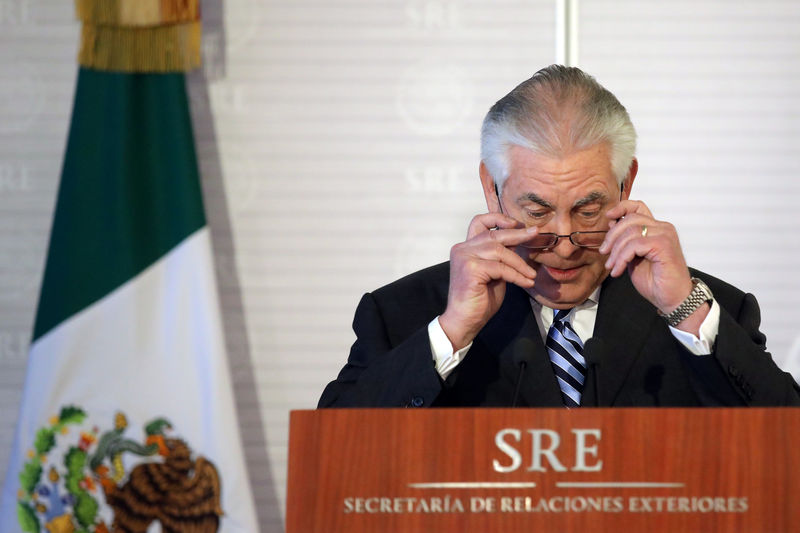By Yeganeh Torbati
WASHINGTON (Reuters) - The U.S. State Department released its annual report on human rights around the world on Friday but the release was overshadowed by criticism that Secretary of State Rex Tillerson gave the report little of the traditional attention or fanfare.
Tillerson declined to unveil the report in person, breaking with precedent established during both Democratic and Republican administrations. A senior U.S. official answered reporters' questions by phone on condition of anonymity rather than appearing on camera, also a break with precedent.
"The report speaks for itself," the official said in response to a question about why Tillerson did not unveil it. "We're very, very proud of it. The facts should really be the story here."
The report, mandated by Congress, documents human rights conditions in nearly 200 countries and territories and is put together by staff in U.S. embassies. This year's report was largely completed during former President Barack Obama's tenure.
According to the report, Philippine police and vigilantes "killed more than 6,000 suspected drug dealers and users" since July and extrajudicial killings have "increased sharply" in the Philippines in the last year. Philippine officials say their government does not tolerate human rights violations or state-sponsored extrajudicial killings.
The report's language on Russia remained broadly similar to that of years past, noting the country's "authoritarian political system dominated by President Vladimir Putin."
President Donald Trump has said he would like to improve U.S. relations with Russia.
Traditionally, the secretary of state unveils the report with public comments emphasizing the centrality of human rights in U.S. foreign policy and highlighting specific findings.
Tillerson's Democratic predecessors John Kerry and Hillary Clinton gave public comments on the report in 2013 and 2009, their first years in the post, respectively, and continued to present it throughout their tenures.
In 2005, during Republican President George W. Bush's administration, the undersecretary of state for global affairs, Paula Dobriansky, presented the report on camera on behalf of Secretary of State Condoleezza Rice.
So far in his one-month tenure, Tillerson has not held a news conference and has mostly refrained from answering questions from the media.
Human rights groups criticized the way the report was rolled out.
"It's just signaling a lack of basic interest and understanding in how support for human rights reflects what's best about America," said Rob Berschinski, senior vice president for policy at Human Rights First.
Berschinski was deputy assistant secretary of state for democracy, human rights and labor until Jan. 20, and helped coordinate the report.
On Friday, the U.S. official quoted from Tillerson's confirmation hearing to offer proof that he views human rights conditions as crucial to U.S. interests, adding, "These statements are very clear about our commitment to human rights."
In the introduction to this year's report, Tillerson wrote "our values are our interests when it comes to human rights."
But in his confirmation hearing, Tillerson sidestepped questions on human rights conditions in other countries, declining to condemn countries like Saudi Arabia and the Philippines, saying he wanted to see the facts first.
Republican Senator Marco Rubio on Friday said on his Facebook (NASDAQ:FB) page he was "disappointed that the secretary of state did not personally present the latest report."

"American leadership in defense of basic human rights, on behalf of those whose voices have been silenced, is needed now more than ever," Rubio wrote.